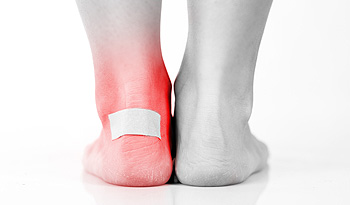 Blisters form on the feet when there is friction between the skin and the inside of the shoe. Because of the influence shoes may have on forming blisters, ensuring that your shoes fit properly is one of the most important steps to preventing blisters. Redness on the skin is usually the first sign of a blister, and applying some sort of dressing over the area can help prevent it from forming. Because wet shoes, boots, and socks cause blisters to form faster, keeping the feet dry is another key step to avoiding the formation of blisters. Patients who frequently get blisters should consult with a podiatrist in order to help find the cause of the blisters. Additionally, patients with diabetes should also consult a podiatrist after noticing a blister in order to keep a diabetic foot ulcer from forming.
Blisters form on the feet when there is friction between the skin and the inside of the shoe. Because of the influence shoes may have on forming blisters, ensuring that your shoes fit properly is one of the most important steps to preventing blisters. Redness on the skin is usually the first sign of a blister, and applying some sort of dressing over the area can help prevent it from forming. Because wet shoes, boots, and socks cause blisters to form faster, keeping the feet dry is another key step to avoiding the formation of blisters. Patients who frequently get blisters should consult with a podiatrist in order to help find the cause of the blisters. Additionally, patients with diabetes should also consult a podiatrist after noticing a blister in order to keep a diabetic foot ulcer from forming.
Blisters are prone to making everyday activities extremely uncomfortable. If your feet are hurting, contact Emil Lavian,DPM of Maven Podiatry. Our doctor can provide the care you need to keep you pain-free and on your feet.
Foot Blisters
Foot blisters develop as a result of constantly wearing tight or ill-fitting footwear. This happens due to the constant rubbing from the shoe, which can often lead to pain.
What Are Foot Blisters?
A foot blister is a small fluid-filled pocket that forms on the upper-most layer of the skin. Blisters are filled with clear fluid and can lead to blood drainage or pus if the area becomes infected.
How Do Blisters Form?
Blisters on the feet are often the result of constant friction of skin and material, usually by shoe rubbing. Walking in sandals, boots, or shoes that don’t fit properly for long periods of time can result in a blister. Having consistent foot moisture and humidity can easily lead to blister formation.
Prevention & Treatment
It is important to properly care for the affected area in order to prevent infection and ease the pain. Do not lance the blister and use a Band-Aid to provide pain relief. Also, be sure to keep your feet dry and wear proper fitting shoes. If you see blood or pus in a blister, seek assistance from a podiatrist.
If you have any questions, please feel free to contact our office located in New York, NY . We offer the newest diagnostic and treatment technologies for all your foot care needs.
Read more about Blisters on the Feet
